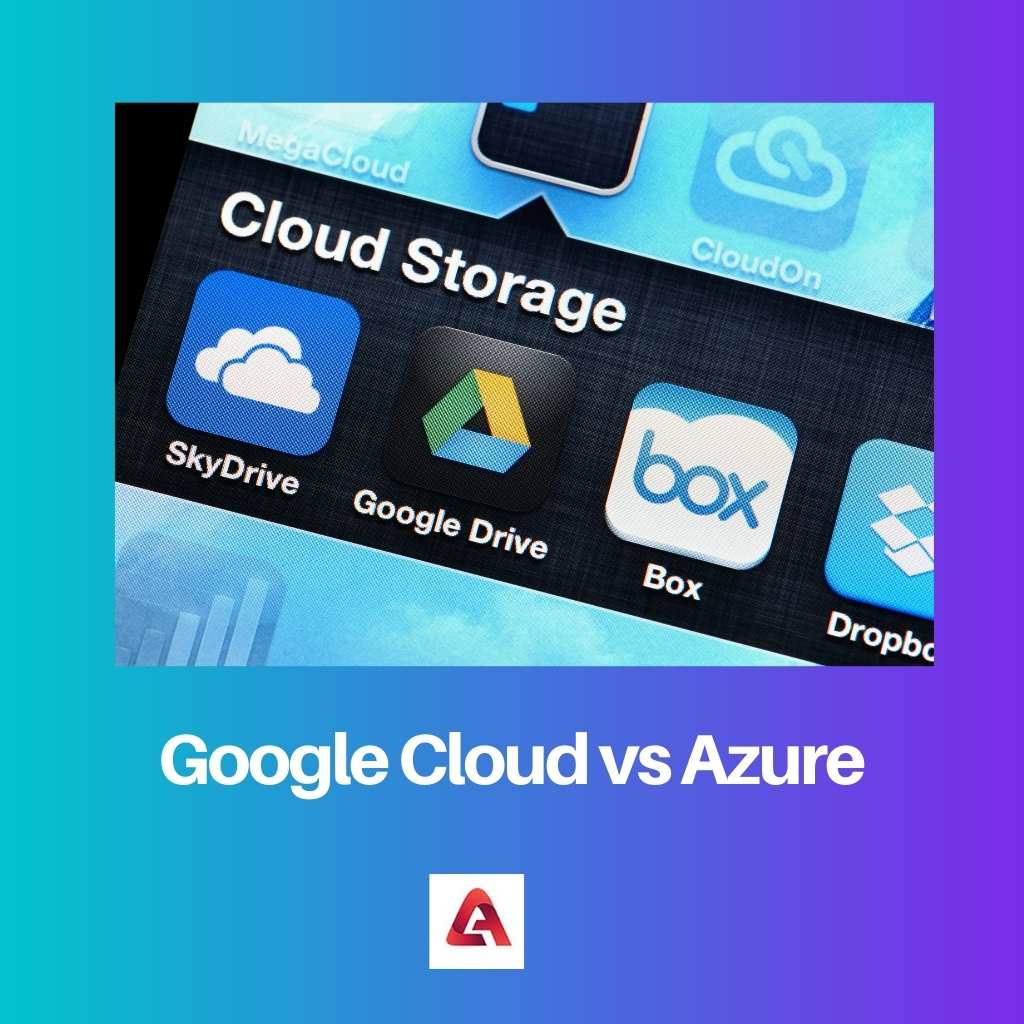Cloud computing refers to the delivery of technological services like storage, processing, databases, and software. Microsoft launched its cloud computing platform and Google Cloud is its biggest competitor.
These two are the biggest technology giants in the world and this fact applies to their cloud computing as well.
Key Takeaways
- Google Cloud excels in data analytics, AI, and machine learning services, while Azure provides better support for hybrid cloud environments.
- Azure integrates more seamlessly with Microsoft products and services than Google Cloud.
- Both cloud platforms offer various services and features, but Google Cloud has a more developer-friendly interface.
Google Cloud vs Azure
Google Cloud is a cloud computing platform offered by Google that provides infrastructure as a service (IaaS), PaaS, and serverless computing environments. Azure, is a cloud computing platform offered by Microsoft that provides IaaS, PaaS, and software as a service (SaaS) services.

Google Cloud provides more than 100 services and products on its platform. These include various categories such as storage servers, networking software, and Management computing.
It also has an identity, security, and Internet of Things support system. Google is of the biggest technology companies in the world, and one of the biggest in general. They have a lot of resources in Google Cloud as well.
Azure or Microsoft Azure is one of the largest cloud computing platforms because it is manufactured by Microsoft, which also makes the largest PC operating system in the world, making excellent compatibility possible.
It offers more than 600 services based on virtualization and IoT. It is managed through Microsoft data centers.
Comparison Table
| Parameters of Comparison | Google Cloud | Azure |
|---|---|---|
| Launch Date | It was launched on April 7, 2008. | It was launched 13 years ago on October 27, 2008. |
| Ease of Use | Google Cloud has a very easy-to-learn infrastructure at the cost of lacking some advancements. | Azure has extremely sophisticated software infrastructure and is hard to lead to use. |
| Payment Structure | It is billed on a pay-per-second basis. | It is billed on a pay-per-minute basis. |
| Data Warehouse | Google Cloud uses Big Query as its data warehouse. | Azure uses an SQL warehouse as its data warehouse. |
| Maximum Memory | In its Virtual Machine, Google Cloud has a maximum memory of 1433 GB. | In its Virtual Machine, Azure has a maximum memory of 3800 GB. |
What is Google Cloud?
Google is a platform by Google meant for its and third partys’ cloud computing needs. It came out thirteen years ago and has, since then, established itself as a big player in the market.
It is an infrastructure as a service (IAAs) platform which provides a plethora of technological services.
It has computing products in which the most prominent is the App Engine, which is a platform as a service model to augment the development of mobile applications on environments such as Java, Go, Node, PHP, and Ruby.
It also has a similar engine called the compute engine that helps in the development and functioning of Operating Systems such as Linux.
It also has exceptional storage and database facilities as it contains various types of cloud storage such as Cloud Bigtable, Cloud SQL, etc.
Google has one of the largest pools of advanced technological resources that is constantly updating and improving the Google Cloud algorithms. A revolutionary step taken by Google was to introduce pay per-second basis for the usage of Google Cloud services.
The Google Cloud servers are extremely secure, as any cloud software has to be to gain reliability in the market by clients. It uses Identity-Aware Proxy and other techniques to achieve this high level of security.

What is Azure?
Azure is a cloud computing platform by tech giant Microsoft. It is very heavily developed and intricate but in return offers very high functionality and customizability.
Its learning curve is also very steep. It was called “Project Red Dog” before it was renamed and officially launched as Azure.
The biggest benefit of Azure over other Cloud Computing services is its integrated delivery pipeline, on-demand scalability, and extremely high-level development tools.
It offers hundreds of services across various domains such as mobile, infrastructure, storage, communication, and Identity. It is very flexible and can offer proprietary as well as open-source engines, as desired by app developers.
Linux is the mode widely developed ecosystem on Azure. It uses the VNet Virtual Network. Microsoft’s service also has a very high reputation in regards to the support and developmental help received while working with Azure.
The Azure IoT Hub integrates millions of IoT devices and is available to use. Under its media services, Azure markets itself as Azure Media Services, and that too has a lot of tools such as analytics, content security, copyright, etc.
Azure is available in more than 60 geographical regions. Azure was previously known as Windows Azure but changed in 2014 to Microsoft Azure.
Main Differences Between Google Cloud And Azure
- Google Cloud has a marketplace named G suite where it is combined with other services, whereas Azure has a marketplace simply as Azure.
- The maximum of processors in Google Cloud’s virtual memory is 96 whereas Azure has a maximum of 128 processors in its Virtual Memory.
- Google Cloud uses CloudCDN which is one of the best for catching whereas Azure uses RedisCache for catching.
- The Block storage employed by Google Cloud uses persistent disks whereas, in Azure, Page Blobs are used.
- The application program interface management used in Google Cloud uses cloud endpoints whereas Azure uses the Azure API Gateway for this purpose.

- https://ieeexplore.ieee.org/abstract/document/6529276/
- https://link.springer.com/content/pdf/10.1007/978-1-4842-1043-7.pdf
